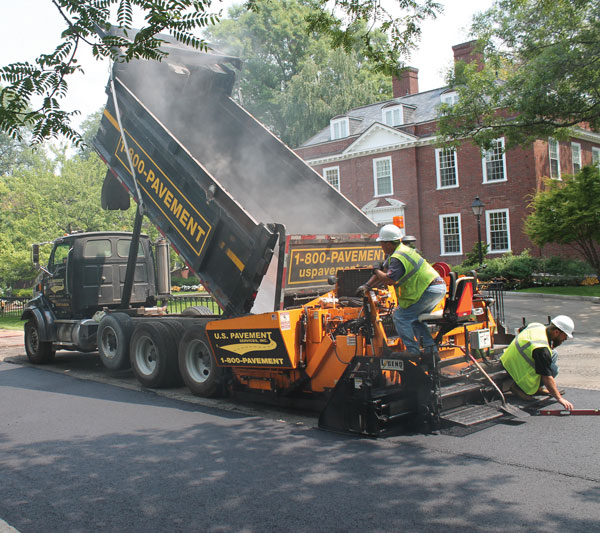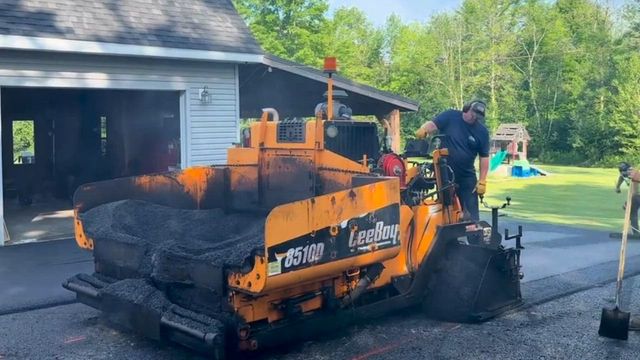An Introduction of the Kinds Of Asphalt Paving Available Through Professional Paving Provider
In the realm of construction and infrastructure, recognizing the different kinds of asphalt paving is essential for making notified choices. Specialist paving services provide a variety of alternatives, consisting of Hot Mix Asphalt, understood for its strength, and environmentally friendly choices like Warm Mix Asphalt. Furthermore, remedies such as Cold Mix Asphalt and Permeable Asphalt satisfy certain requirements, while Recycled Asphalt Pavement highlights sustainability. Each kind offers unique advantages, but the selection ultimately relies on job requirements and conditions. Analyzing these choices reveals even more regarding their respective applications and advantages, prompting more exploration into their viability for your forthcoming jobs.
Hot Mix Asphalt
What makes hot mix asphalt a recommended option for lots of paving tasks? Hot mix asphalt (HMA) is renowned for its resilience, versatility, and cost-effectiveness, making it a perfect choice for a large range of applications, from freeways to domestic driveways. HMA is produced by home heating asphalt binder and accumulation to high temperatures, which ensures an uniform blend that sticks well to surfaces. This process permits reliable compaction, leading to a smooth and durable finish.
(sign up)The high-temperature application of HMA not only helps with far better bonding yet likewise boosts the product's load-bearing ability, allowing it to stand up to the tensions enforced by car traffic. Its fast healing time decreases disruption throughout building and construction, enabling roads to resume earlier.
Environmental considerations are also addressed with HMA, as it can be reused and recycled in various projects, adding to sustainable practices in paving. Additionally, breakthroughs in modern technology have actually boosted its efficiency features, making certain longevity and minimized maintenance needs. These characteristics solidify warm mix asphalt as the gold criterion in the paving sector, offering a dependable solution for both heavy-duty and light-duty surface areas.
Warm Mix Asphalt
Warm mix asphalt (WMA) is significantly used in paving projects as a result of its ability to be created and laid at lower temperatures contrasted to conventional hot mix asphalt. This modern technology enables the production of asphalt at temperature levels varying from 100 ° F to 250 ° F less than standard techniques, which considerably reduces power usage and greenhouse gas emissions throughout manufacturing.

One of the primary advantages of WMA is its prolonged workability duration, which allows contractors to collaborate with the product for a longer period prior to it sets. This characteristic is specifically valuable in cooler climate condition, where standard hot mix asphalt may cool also rapidly to be laid effectively. WMA can be conveniently mixed with recycled materials, improving sustainability efforts within the asphalt paving market.
In addition, the lower temperature level application of WMA minimizes the risk of thermal segregation, causing a more consistent and resilient sidewalk surface. As a result, WMA not only adds to boosted performance qualities however likewise lowers the general environmental influence of asphalt paving jobs. This combination of benefits makes warm mix asphalt a progressively popular selection amongst paving professionals and clients alike.
Cold Mix Asphalt
Cold mix asphalt is a functional paving service that is especially efficient for patching and repairing surfaces in various weather. Unlike warm mix asphalt, which calls for heating, cool mix asphalt can be applied straight from its container, making it an optimal option for quick repair work and maintenance jobs. This kind of asphalt is made up of a combination of aggregate and emulsified asphalt, permitting it to stay convenient at lower temperatures.
(see more)One of one of the most substantial benefits of chilly mix asphalt is its simplicity of application. It can be utilized in both household and commercial projects, offering a functional alternative for repairing pits, fractures, and other surface imperfections. In addition, chilly mix asphalt is ideal for usage in damp problems, allowing fixings to be made also throughout severe weather condition.
While it is normally not used for hefty traffic surfaces because of its reduced stamina compared to hot mix asphalt, chilly mix is an outstanding option for momentary solutions or locations with lighter website traffic. Its adaptability and adaptability make it a useful option for preserving asphalt surface areas, guaranteeing long life and efficiency also under challenging conditions.
Permeable Asphalt

Absorptive asphalt offers a cutting-edge remedy for taking care of stormwater drainage, resolving a crucial ecological problem often associated with standard asphalt paving. This kind of asphalt is designed with a permeable structure, permitting rain to infiltrate with the surface area and right into a sub-base, where it can be slowly taken in right into the ground or managed in a controlled fashion.
The advantages of permeable asphalt prolong past water management; they additionally add to minimizing city warmth island impacts and boosting groundwater recharge - paving. By decreasing surface overflow, absorptive asphalt assists decrease the threat of flooding and erosion, which can be specifically useful in metropolitan areas susceptible to heavy rainfall
Installation of absorptive asphalt needs cautious factor to consider of website problems and correct design to make sure ideal efficiency. It is necessary to develop a well-drained sub-base and to keep the permeability through regular cleansing to stop blocking from debris and debris.
Recycled Asphalt Sidewalk
Recycled asphalt pavement (RAP) is a progressively preferred choice in the paving sector, using both economic and ecological benefits. By recycling asphalt millings from old roadways, RAP minimizes the demand for brand-new products, hence decreasing expenses and minimizing the ecological impact click this link related to asphalt manufacturing.
The procedure of producing RAP involves crushing existing asphalt surface areas and processing the product to eliminate contaminants. This recovered product is then integrated with brand-new asphalt binder and accumulations to produce a high-grade paving mix. Making use of RAP can dramatically lower the amount of waste sent to land fills, adding to a much more sustainable technique to roadway construction.
RAP is particularly useful for tasks where budget plan constraints are an issue, as it can decrease product expenses by approximately 30%. In addition, the performance of RAP approaches that of virgin asphalt, providing longevity and durability. It appropriates for various applications, consisting of property driveways, industrial car park, and roadway resurfacing.
As communities and contractors progressively prioritize sustainable techniques, recycled asphalt pavement sticks out as a viable option that satisfies both economic needs and environmental obligations, making it an engaging alternative for modern-day paving tasks.

Conclusion
In recap, professional paving services use a diverse series of asphalt paving alternatives customized to certain building and construction needs. Each kind, consisting of Warm Mix Asphalt, Cozy Mix Asphalt, Cold Mix Asphalt, Permeable Asphalt, and Recycled Asphalt Pavement, provides special benefits that cater to both residential and industrial requirements - paving service. The option of the proper asphalt type not only boosts sturdiness and performance however also addresses environmental problems and sustainability, making sure efficient and efficient leading remedies